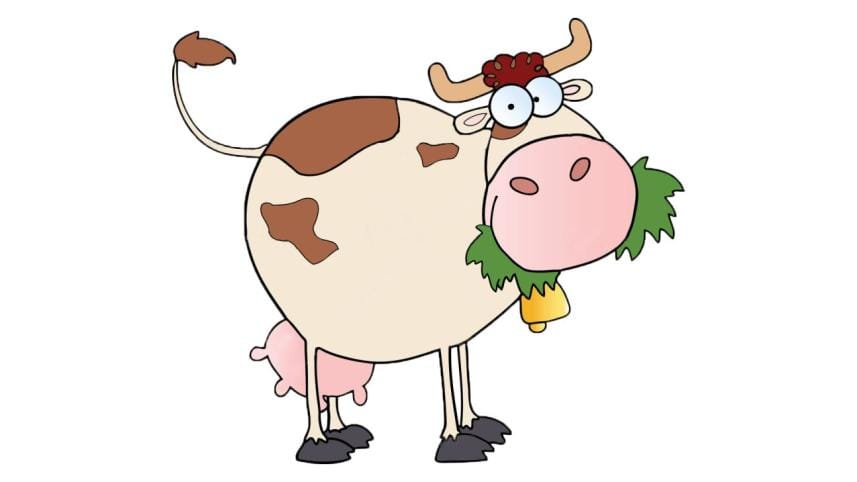Why does the Indian home minister have a beef with beef?

GOD knows what madness came upon the Indian Union Home Minister Rajnath Singh on April 1, the day he instructed his BSF men to put a complete halt to the smuggling of cattle to Bangladesh. He said he was aware prices of beef in Bangladesh had gone up by 30 percent due to heightened vigil by BSF against cattle smuggling. To this extent, Singh sounded like an informed politician, who had in his heart the best interest of his country.
The madness part was when he asked BSF to stop cattle smuggling completely and speculated that the prices of beef should go up by 70-80% forcing Bangladeshis to give up eating beef. This is where it seemed like he personally has a beef with the people of this country. Needless to say, what we eat is none of his business.
The Indian minister's comment was prompted by his support of a nationwide ban on cow slaughter in his country. What India does to Indians is its own internal matter. But what it does to us is unsolicited interference that leaves a bad taste in the mouth.
Of course, the day he chose to make this senseless statement had its own significance. It was April Fool's Day, and maybe the Indian minister was playing a practical joke on the people of the neighbouring country. Maybe, he just wanted us to have a good laugh and then forget that he ever said it.
Every year, nearly 2.5 million cattle are smuggled into Bangladesh from India. It's God's work that a beef-loving nation of more than 160 million people should be juxtaposed with a country of 1.27 billion people, roughly 90% of whom are beef averse. What is holy to some is haute cuisine to others. In economics, gains from such differences are called comparative advantage.
It's estimated that if India stops cattle smuggling to Bangladesh, it will have 12.5 million dry cattle to feed annually. The life expectancy of cows in India varies from 15 to 20 years. If Bangladeshis are starved of beef, India will have to incur an annual expenditure of Rs. 310 billion to feed these cows until they die naturally. The amount doesn't include the cost of acquiring land for cowsheds and initial investment in building the infrastructure.
Economics aside, the politics of it has shocked Bangladeshis. While Indians have every right to control their cattle, Bangladeshis have the right to decide how to accommodate their appetite. If necessary, they could raise their own cattle and import beef from other countries to meet local demand. Failing that, it should be their call whether to cut down on beef consumption or do otherwise.
But an Indian minister cannot dictate at what price we should stop eating beef in this country or how we should plan our diet. Whatever intention he had in mind while making this statement, it smacked of bitter vengeance as if he would like to see Bangladeshis suffer for their love of beef. It doesn't make sense that he should be so upset with us.
It may not have occurred to Rajnath Singh that it takes two hands to clap in regards to smuggling. The Indian traders have to bring their cattle to the border before the Bangladeshi traders get there to retrieve them. It's a lucrative business on both sides of the border. The minister would have been fair were his spite directed at both sides in equal shares.
If this is any indication, we should think twice before depending on anything that is under the control of the Indian government. The enclaves, water sharing, massive trade imbalance and, now, the cattle supply are enough warnings that India likes to deprive us of our rightful shares. Electricity from India is another concern. If a cranky Indian politician decides Bangladeshis are having too much fun with electric fans and light, he might curtail power supply.
In 2001, the Indian daily The Hindu reported that 72 Hindu communities in Kerala preferred beef to the expensive mutton. It also said that Hindu gods Indra and Agni both had weakness for cow meat. Even the seminal Hindu text Manusmriti didn't prohibit the consumption of beef. The daily also refuted that Hinduism prohibited eating beef.
India is the world's second largest beef exporter after Brazil. When the Congress Party was in power it aggressively promoted beef sales abroad. The BJP government and the Hindutva forces are trying to change that in the land where cows are sacred.
Beef eaters in Bangladesh are caught in that Indian dilemma, and Singh only made it obvious with his scurrilous comment. Every time we pick our teeth after eating high-priced beef, we can hope that it pricks his conscience.
The writer is the Editor of the weekly First News and an opinion writer for The Daily Star.
Email: badrul151@yahoo.com




 For all latest news, follow The Daily Star's Google News channel.
For all latest news, follow The Daily Star's Google News channel.
Comments